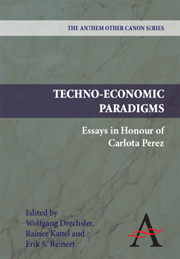Book contents
- Frontmatter
- Contents
- Preface
- Techno-Economic Paradigms
- 1 Introduction: Carlota Perez and Evolutionary Economics
- 2 Developing Innovation Capability: Meeting the Policy Challenge
- 3 Slow Food, Slow Growth … Slow ICT: The Vision of Ambient Intelligence
- 4 Technical Change and Structural Inequalities: Converging Approaches to Problems of Underdevelopment
- 5 The New Techno-Economic Paradigm and its Impact on Industrial Structure
- 6 Governance in and of Techno-Economic Paradigm Shifts: Considerations for and from the Nanotechnology Surge
- 7 Innovation Policy and Incentives Structure: Learning from the Mexican Case
- 8 Schumpeter's Business Cycles and Techno-Economic Paradigms
- 9 Asian Innovation Experiences and Latin American Visions: Exploiting Shifts in Techno-Economic Paradigms
- 10 Doing Capitalism: Notes on the Practice of Venture Capitalism (Revised and Extended)
- 11 Small States, Innovation and Techno-Economic Paradigms
- 12 Financial Experimentation, Technological Paradigm Revolutions and Financial Crises
- 13 Why the New Economy is a Learning Economy
- 14 The Art of Macro-Qualitative Modelling: An Exploration of Perez' Sequence Model of Great Surges
- 15 Technology, Institutions and Economic Development
- 16 Techno-Economic Paradigms and the Migration (Relocation) of Industries to the Peripheries
- 17 On the Discreet Charm of the (Rentier) Bourgeoisie: The Contradictory Nature of the Installation Period of a New Techno-Economic Paradigm
- 18 Production-Based Economic Theory and the Stages of Economic Development: From Tacitus to Carlota Perez
- 19 Carlota Perez' Contribution to the Research Programme in Public Management: Understanding and Managing the Process of Creative Destruction in Public Institutions and Organizations
- 20 Carlota Perez – Her Biography and the Origins of her Ideas
- Notes
- Bibliography Carlota Perez
14 - The Art of Macro-Qualitative Modelling: An Exploration of Perez' Sequence Model of Great Surges
Published online by Cambridge University Press: 05 March 2012
- Frontmatter
- Contents
- Preface
- Techno-Economic Paradigms
- 1 Introduction: Carlota Perez and Evolutionary Economics
- 2 Developing Innovation Capability: Meeting the Policy Challenge
- 3 Slow Food, Slow Growth … Slow ICT: The Vision of Ambient Intelligence
- 4 Technical Change and Structural Inequalities: Converging Approaches to Problems of Underdevelopment
- 5 The New Techno-Economic Paradigm and its Impact on Industrial Structure
- 6 Governance in and of Techno-Economic Paradigm Shifts: Considerations for and from the Nanotechnology Surge
- 7 Innovation Policy and Incentives Structure: Learning from the Mexican Case
- 8 Schumpeter's Business Cycles and Techno-Economic Paradigms
- 9 Asian Innovation Experiences and Latin American Visions: Exploiting Shifts in Techno-Economic Paradigms
- 10 Doing Capitalism: Notes on the Practice of Venture Capitalism (Revised and Extended)
- 11 Small States, Innovation and Techno-Economic Paradigms
- 12 Financial Experimentation, Technological Paradigm Revolutions and Financial Crises
- 13 Why the New Economy is a Learning Economy
- 14 The Art of Macro-Qualitative Modelling: An Exploration of Perez' Sequence Model of Great Surges
- 15 Technology, Institutions and Economic Development
- 16 Techno-Economic Paradigms and the Migration (Relocation) of Industries to the Peripheries
- 17 On the Discreet Charm of the (Rentier) Bourgeoisie: The Contradictory Nature of the Installation Period of a New Techno-Economic Paradigm
- 18 Production-Based Economic Theory and the Stages of Economic Development: From Tacitus to Carlota Perez
- 19 Carlota Perez' Contribution to the Research Programme in Public Management: Understanding and Managing the Process of Creative Destruction in Public Institutions and Organizations
- 20 Carlota Perez – Her Biography and the Origins of her Ideas
- Notes
- Bibliography Carlota Perez
Summary
Technological Revolutions and Financial Capital is one of the most important books written on capitalism. Historically and theoretically! How can such a statement be made on Carlota Perez' first and (so far) only book? How can a slim volume of about 180 pages be mentioned together with works such as the 2,350 page Das Kapital by Marx, Schumpeter's 1,400 pages of Business Cycles or Å;kerman's 930 pages of Ekonomisk Teori?
Åkerman? Why mention a scarcely-ever-quoted Swedish economist (1896–1982) together with always-quoted scholars such as Marx and Schumpeter? One reason is that I happen to know that Carlota Perez appreciates his main book (Å;kerman 1944, which was translated into Spanish in 1960) above Schumpeter's work, although she – like most others (except Kindleberger 1978, Goldstein 1988) – commits the sin of not quoting it. But a more important reason is this: There is a close connection between the claim that Perez' work is theoretically important, and the paradoxical fact that most of Åkerman's work entitled ‘Economic Theory’ contains an empirical analysis of the core capitalist countries in the 1820–1940 period.
Åkerman and Perez share the same basic substantive research problem: How can patterns in the development of the core capitalist group of countries since the late eighteenth century be reconstructed in a way that serves the analysis of present economic developments? Å;kerman was a founding member of the Econometric society, but rather than converting to the econometric program of statistical inference (the Cowles commission approach as pioneered by Haavelmo and others), he continued to pursue a ‘low tech’ approach to the analysis of economic time series.
- Type
- Chapter
- Information
- Techno-Economic ParadigmsEssays in Honour of Carlota Perez, pp. 239 - 268Publisher: Anthem PressPrint publication year: 2009



